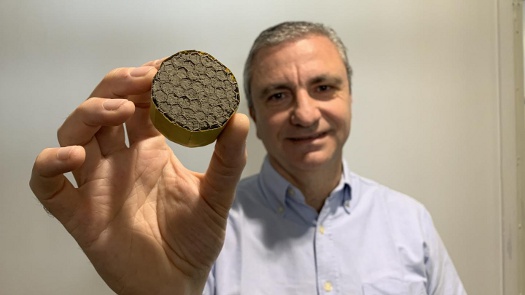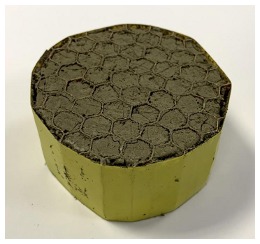 |
| June 22, 2021 | Volume 17 Issue 24 |
Designfax weekly eMagazine
Archives
Partners
Manufacturing Center
Product Spotlight
Modern Applications News
Metalworking Ideas For
Today's Job Shops
Tooling and Production
Strategies for large
metalworking plants
New aerogel could cut aircraft engine noise dramatically

Professor Michele Meo with lightweight aerogel suspended in a honeycomb structure. [Credit: University of Bath]
An incredibly light new material that can reduce aircraft engine noise and improve passenger comfort has been developed at the University of Bath in the U.K.
The graphene oxide-polyvinyl alcohol aerogel weighs just 2.1 kg/m3, making it the lightest sound insulation ever manufactured. Its makers say it could be used as insulation within aircraft engines to reduce noise by up to 16 decibels -- an incredible amount that would reduce the 105-decibel roar of a jet engine taking off to a sound closer to that of a hair dryer. It's a really bold claim, but even cutting engine noise half that amount would be a major feat.
The aerogel's meringue-like structure makes it extremely light, meaning it could act as an insulator within aircraft engine nacelles, with almost no increase in overall weight. The material is currently being further optimized by the research team to offer improved heat dissipation, offering benefits to fuel efficiency and safety. Graphene is already known to withstand very high temperatures.

Close-up of the lightweight aerogel suspended in a honeycomb structure. [Credit: University of Bath]
Researchers from Bath's Materials and Structures Center (MAST) have published a method for manufacturing the materials in the journal Nature Scientific Reports.
"This is clearly a very exciting material that could be applied in a number of ways -- initially in aerospace but potentially in many other fields such as automotive and marine transport, as well as in building and construction," says Professor Michele Meo, who led the research.
"We managed to produce such an extremely low density by using a liquid combination of graphene oxide and a polymer, which are formed with whipped air bubbles and freeze-casted. On a very basic level, the technique can be compared with whipping egg whites to create meringues; it's solid but contains a lot of air, so there is no weight or efficiency penalty to achieve big improvements in comfort and noise."
Although the team's initial focus is in working with partners in aerospace to test the material as a sound insulator in airplane engines, they say it could also be used to create panels in helicopters or car engines. They estimate that the aerogel could be in use within 18 months.
Please direct technical and development questions about the aerogel to Professor Michele Meo in the Department of Mechanical Engineering, Materials and Structures Center (MAST), at M.Meo@bath.ac.uk.
Source: University of Bath
Published June 2021
Rate this article
View our terms of use and privacy policy
